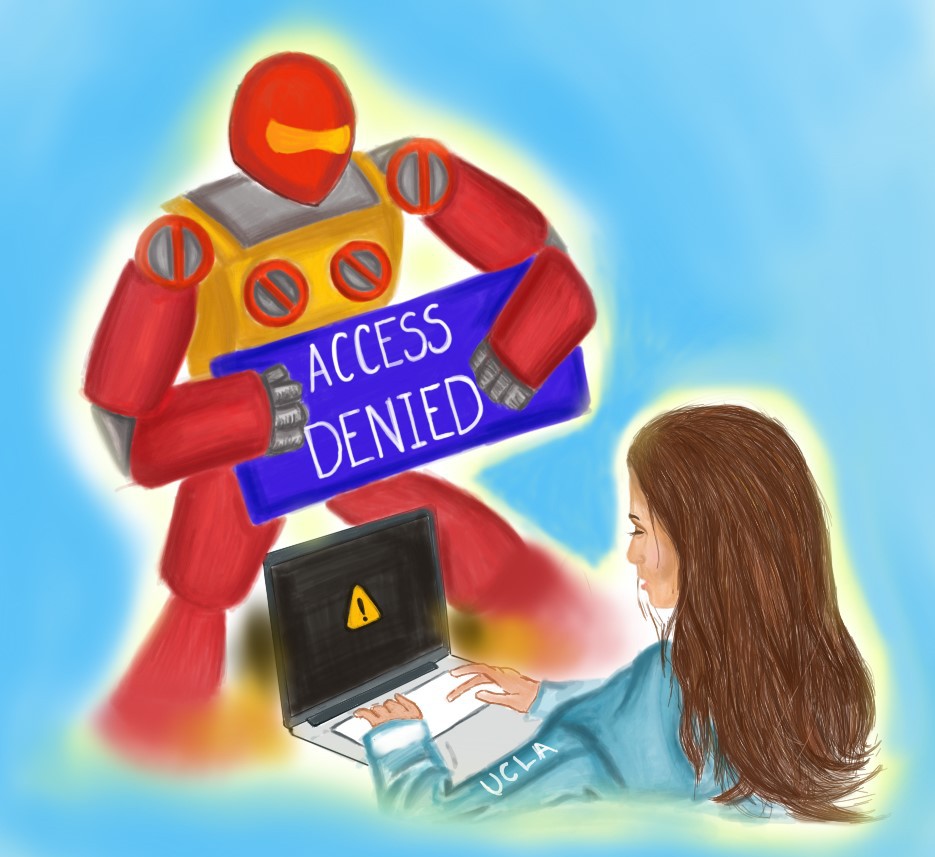The UC and Elsevier are refusing to compromise at unacceptable cost to students

(Vaibhavi Patankar/Daily Bruin)

By EJ Panaligan
Nov. 6, 2019 10:57 p.m.
The room with the negotiating table isn’t the most pleasant room to be a part of.
But when hundreds of thousands of students are denied access to valuable research, there’s no other place negotiators should be.
It has been almost four months since the University of California’s California Digital Library lost direct access to Elsevier’s journals. Elsevier is one of the largest scientific publishers in the world, owning over 2,500 research journals that UC students and researchers were once able to access. The last agreement between the two parties, which valued at about $10.5 million, ended in December.
Negotiations for a new deal continued into the new year, but firmly broke off at the end of February over differing opinions on both sides about costs and access.
The CDL wanted to lower subscription costs and publish its research with open access to the public, while Elsevier wanted to charge publishing fees to UC authors on top of the monumental subscription cost – a cost that has seen incremental increases since 2014.
At the core of this standoff are two parties bickering with each other on the basis of unfeasible demands. Meanwhile, students will be the ones paying the price.
The UC and Elsevier must find a middle ground and come to a reasonable agreement to renew their annual subscription – one that both sides can feel content with. And that doesn’t mean one side or the other getting their way; it means compromise – in the fullest sense of the word. Because every day that goes by without an agreement means more students are getting swindled for something that’s beyond their own control.
During negotiations, the UC, with support from the Academic Senate, had pushed heavily for full open access publishing – a method that directly contradicts Elsevier’s profit-driven business model. With it would go any sense of exclusivity Elsevier might have that would keep their already-high subscription costs feasible.
And their final proposal before negotiations stalled reflected that – they would allow open access publishing for only 30% of the UC’s research.
On the other hand, the UC’s November 2018 proposal indicated that not only were they unwilling to pay more to offset the increase in open access publishing, they were looking to pay 10% less than the total of their 2018 contract agreement.
The UC can’t have its cake and eat it too. And with Elsevier clamoring to join in, students are left without even a slice.
Their commitment to open access publishing is justified and admirable, but they should’ve known that it comes with a price when their desires shaped up to be a direct attack at Elsevier’s pockets. Their proposals turned to a point of greediness that was not fair to Elsevier, and negotiations fell off as a result.
Disagreements are fundamental to standoffs in any negotiation, as both sides always want the best outcome for themselves without feeling like they’re the ones getting fleeced.
But in this case, that standoff comes at the cost of students’ educations.
Those at both the undergraduate and graduate level are left without access to a significant resource that helps supplement their coursework and hinders their ability to find the right articles for their research papers and projects.
And this open access movement has made its way to UCLA students at the ground level. On Oct. 25, the California Public Interest Research Group hosted a roundtable discussion promoting advocacy toward making public research readily available to everyone.
Prabhdeep Rai, a third-year history student and CALPIRG campaign coordinator for the Make Textbooks Affordable campaign, said the roundtable helped to start a dialogue about textbook costs and accessible course materials.
“It’s really exciting that the UC has made this public announcement and this commitment to open journals and research,” Rai said. “They’ve been working toward committing to open access, and Elsevier isn’t letting them do that.”
Along with this student engagement, UC faculty members have voiced concern over a lack of agreement between the two parties. In early August, 31 professors and researchers stopped their editorial commitments for journals under Elsevier in protest of the negotiations standoff, citing hope that an appropriate resolution be made.
Multiple UC faculty members who signed the letter have declined to comment.
Now, the pressure is on from students and researchers, as the open access movement will continue to grow beyond Elsevier. And despite their claims that they support it, their negotiations with CDL proved otherwise.
Unfortunately, Elsevier isn’t the belle of the ball anymore – other suitors are more than willing to fill in the gaps they left behind with their stoppage of service.
It’s in their best interest to strike a deal with the UC before they lose a valuable client for good. On the other end, it’s in the UC’s best interest to lower their bargaining expectations for the sake of their students.
Of course, there are other publishers and research databases that students rely on, like JSTOR, and older articles published with Elsevier might be cross-published and accessible through other platforms at later dates. But the issue isn’t that Elsevier content can be found elsewhere, it’s that students are being denied access to such a wealth of research at all that remains concerning. Clearly, if both the UC and Elsevier were fully committed to open access publishing as they claim to be, this standoff in negotiations should have already been put to an end.
Both parties have had their moments of justified proposals, coupled with moments of irrational demands.
And the next time they see each other at the negotiating table, they hopefully won’t be leaving students hungry for access to knowledge.


